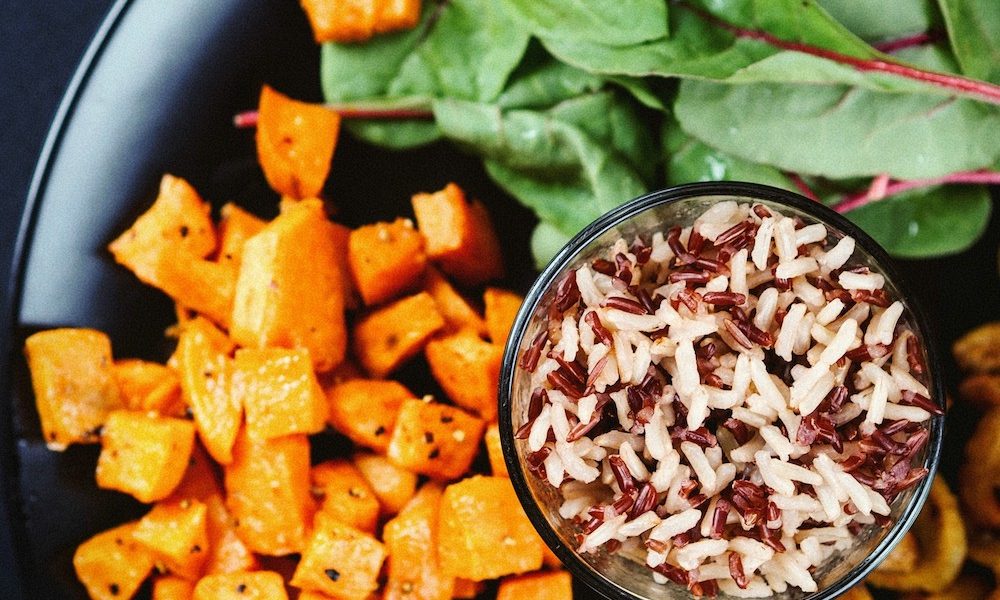With a little thinking ahead, your weekday meals can actually save you time and money. Get organized, use what you have, and most importantly, stay flexible if things don’t go according to plan.
BY: LINDSAY SPARKS, RDN
Raise your hand if you love to eat, but you don’t always the time (or motivation) to cook. You are not alone!
For some, meal planning may be a daunting task. However, I am a big believer that it doesn’t have to be complicated or require hours of prepping on the weekend (if you aren’t into that kind of thing). In fact, setting aside a little time to consider what you will eat throughout the week can be a huge time and energy saver down the road.
There are many different approaches to getting food to your plate — it’s all about experimenting and finding what works best for you. Here are a few meal planning tips to help you get started if you’re looking for a less stressful approach to the game:
1. Assess your kitchen and make a list.
Check to see if you have any expired products or foods that are about to be past their prime and need to be used up ASAP. Be sure to add any staple items to your list (i.e. cooking oil, spices/herbs, eggs, grains, beans) and consider building your meal plan around items that you don’t want to go to waste.
For example, maybe those sweet potatoes that have been sitting on the counter the past two weeks could be turned into a breakfast casserole or roasted as a quick and easy side dish. It also helps to categorize your list with the layout of the grocery store you go to (i.e. produce items, meat, dairy, canned goods, frozen, etc). This helps make the grocery trip itself go a little more smoothly with less running around back and forth between aisles.
2. Evaluate your schedule.
What is your schedule going to look like for the week? Are there particular days of the week that you know you won’t have as much time to spend in the kitchen? Do you have any lunch or dinner dates scheduled for dining out? Planning your meals and snacks around your lifestyle and your schedule is key.
For example, maybe you intentionally cook extra of a meal one day to have for leftovers, serve breakfast for dinner on a night you get home late, or rely on slow-cooker, casseroles, or one-sheet pan meals for less dishes to clean up. If you are crunched on time or are a beginner cook, try looking for recipes that have shorter ingredient lists, don’t need fancy kitchen gadgets, or take less than 30 minutes from start to finish.
3. Ask yourself: what sounds good?
Satisfaction is so important in the eating experience. If we don’t like what we’re eating day after day, it can be difficult to get excited about eating at all. A question to ask yourself is: “what do you actually like to eat?” Instead of thinking about what you “should” be eating, think about what is appealing to you in different seasons of life. If you’re getting bored of the same ol’ same ol’, consider trying a new recipe or ingredient to jazz things up. Try to have foods on hand that can provide a variety of tastes, textures, and temperatures to add interest and variety when the mood strikes.
4. Batch cook a few ingredients or prep ahead one recipe.
Not everyone is a fan of spending more than 1 hour in the kitchen on a day off, just to prep out all of your meals and snacks. I would rather spend my time doing other things I value. If prepping out every single meal for the week seems overwhelming or unrealistic, sometimes batch cooking one or two ingredients or even a single recipe can be more manageable.
Some examples for batch cooking include: hard boiling eggs for a quick snack or add-on protein to a meal, roasting vegetables to reheat as a side, putting chicken in the crock-pot and shredding to use in different ways throughout the week.
5. Consider convenient options such as ready-made frozen meals or products.
From flavorful pesto sauce to interesting salad kits, there are an array of packaged food products you can purchase that still honor your health while saving you time in the kitchen. The idea of “shop the perimeter” of the store is old news! In fact, those middle aisles and freezer sections contain many nutrient-dense, convenient options.
Remember, meal planning can be a form of self-care and ensure that you are nourishing your body.
Fueling your body with a balance of carbs, proteins, fats, fiber through nutrient-dense foods and fun foods is a part of taking care of both your physical and mental health. Keep in mind there is a big difference between a “meal plan”, and the act of planning or prepping meals for your week.
At the end of the day, it’s OK if things do not go to plan. Embrace the gray, remain curious, give yourself some self-compassion, and most of all,
Be open to flexibility.
Adapted from the original article.
HEADER IMAGE: NATALIA Y
Lindsay Sparks, RDN is a Registered Dietitian based in Springfield, MO. In her private practice, she focuses on empowering others to embrace their bodies and live a life well-nourished. Through food, health at every size, and intuitive eating principles, she helps others cultivate meaningful, happy lives. Learn more about Lindsay at Feed Your Spark.

